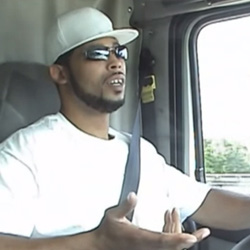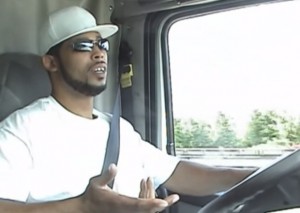
On the Road: Comments and Advice from ‘The Crazy Trucker’
-
Joe Wertz

"The Crazy Trucker" weighed in on our story about the trucking industry and the shortage of commercial drivers.
Our story on the shortage of truck drivers in Oklahoma and around the country started pretty simply.
We report on the economy and the Oklahoma workforce, and there’s one question we routinely ask: Who’s hiring?
There are several academic reasons why there aren’t enough truckers in the U.S., but one of our commenters illustrated a point that’s more experiential than academic: Life on the road is “potentially challenging to any relationship.”
As we reported, the booming energy industry in Oklahoma — and around the country — employs a lot of commercial truck drivers.
That’s good — and bad.
If you’re a motor carrier with a contract to haul sand for hydraulic fracturing, business is brisk. But if you haul baking flour, like Ike Glass’s Newkirk, Okla.-based outfit does, you’ve got new competition for an already small driver pool.
The energy industry tends to pay its drivers more, motor carrier owners and truckers say. Another benefit: When you drive for the energy industry, you’re home a lot more.
Here’s how one of our commenters, Hervy Christmas, who’s known on the Internet as “The Crazy Trucker,” explains it:
The main thing is before driving making sure that you and your situation are compatible for the trucking lifestyle. The varies greatly depending on the type of trucking job that you get. As a new driver unless you are hired by one of the energy companies, you will be over the road. This is potentially challenging to any relationship, so keep that in mind.
The Crazy Trucker runs lifeasatrucker.com, where he blogs, philosophizes, answers questions and offers advice — and big-rig recipes! — for truckers and those interested in the industry.
He also has more than 1 million views on his YouTube channel, where he dispenses trucking-related interviews and advise as well as perspectives on relationships and pop culture.
In his comment on our story, The Crazy Trucker also weighed in on relatively new federal regulation of drivers and motor carriers. Truckers and company owners we interviewed say the data-driven Compliance Safety Accountability program have helped drain the driver pool even more.
Inspections are a big part of the CSA program, and seemingly small infractions concerning tractor-trailer maintenance are recorded — effectively scoring both truckers and the companies they work for.
It is an industry wide problem that, as explained creates a catch 22 situation, he comments. In addition to what is mentioned, when you go in the shop for these things it can also mean time off of the road.
Trucking is a low-margin business for motor carriers, and motor carriers are always looking for way to cut down on costs. When times are tough — like in a recession —it’s not uncommon for some carriers to skimp on truck maintenance.
This could mean broken marker lights don’t get replaced, or a frayed brake hose isn’t immediately mended. If a driver is inspected at a weigh station or pulled over by a Highway Patrol trooper, tickets are issued and reports are made, which affects the trucker and the company they drive for.
It’s not fair, but that’s the way it goes, trucker Jonathon Stevens told us.
Commenting, The Crazy Trucker agrees:
The company couldn’t do much for you if they wanted to … it is noble of you to want to be a team player … but not by taking risks. Be a team player with making your appointments on time, taking loads you might not like to take when they need you to.
It’s a tough business. Just ask The Crazy Trucker: The North Carolina company he drove for went out of business, and he’s been off the road since October 2011.
“I may start back driving later if I find the right position for the right money,” he tells StateImpact in an e-mail.
Right now, The Crazy Trucker is taking classes and coaching other drivers. He’s a certified life coach and is studying computers and energy technology. He’s taking his own advise, he says: “Have a backup to trucking.”
“I want people to be informed before they make a final decision to become a truckers so they can make an intelligent decision and stay away if they are not compatible for the lifestyle,” he says. “Otherwise they will end up miserable and represent drivers and the industry poorly.”
